- Home
- Mollie Cox Bryan
Death Among the Doilies Page 2
Death Among the Doilies Read online
Page 2
“I was hoping Jane would be here, but I’m afraid she’s indisposed,” Cora said. At the police station. “In fact, her five-year-old is in the kitchen. I need to check in on her and I’ll be right with you. Please take a seat in the sitting room,” she said, gesturing to the room she had taken such pride in furnishing with overstuffed chairs and couches, big pillows on the floor and around the fireplace, and the arts and crafts made by herself or other generous crafters. The Moroccan-tiled mosaic table was a gift from one of the women in the shelter. A lush chocolate-colored macramé wall hanging hung over the fireplace. Hand-loomed earth-toned rugs were scattered through the room. When Cora mentioned her dream of opening a craft retreat, crafters donated their work—she never asked. Somehow, the room came together as a sort of upscale shabby-chic space that beckoned with warmth and cozy ambience.
“London?” Cora called as she entered the kitchen.
London peeked up over her picture book. “It’s a good story, Cora.” The child didn’t want to be bothered.
“I’ll read it later but now I have a meeting in the sitting room. Do you want to come in there with me?”
London’s eyebrows lifted as if to say, “I’m reading, why don’t you leave me alone?” This was a child who had never been treated like a child. As much as Cora loved Jane, she felt Jane had always expected a bit too much from her daughter.
“Or will you be okay here?” Cora asked.
“I’m good,” London said, and popped another protein ball into her mouth.
Well, okay, then.
Cora left her alone, went into the other room, and sat down next to the caterer on the big velvet sofa. “Now, what do you have for me to review?”
“Local wine and cheese for the opening reception,” Darla said, and presented her with an itemized list and a contract to sign.
After reading everything over, Cora signed her name, trying not to let the cost give her heart palpitations. They were not set up to cook and serve food to large groups of people—yet. The kitchen left a lot to be desired. The retreat fee included a welcome reception, plus three lavish brunches. On the last night, they scheduled a dessert party. Cora hoped this arrangement placed her in good stead with some other local cafés and restaurants. Her guests would be venturing out for their own meals from time to time, even though she planned enough food for the brunches that they could possibly snack on the rest of the day. Snacks were important to creativity.
“We’re getting as much local produce in for your brunches as we can. But what about the dessert party? Do you want to go with a chocolate theme or a seasonal theme—apple pie, pumpkin pie, and so on?” she asked. When Darla said chocolate, a youthful expression came over her face. Cora then wondered if Darla was younger than her first impression implied.
Cora thought a moment about her dessert choices. Her first inclination was always chocolate. But the retreat was advertised as a fall harvest and Halloween retreat. “Will we have plenty of apple and pumpkin food otherwise?”
Darla nodded. “Chocolate then?”
Cora couldn’t resist. Her French roots made chocolate a necessity to her life. At least that’s what she told herself.
A commotion erupted in the kitchen, and Jane’s voice came trailing down the hall.
“You didn’t need to worry about me, sweetie, I was just at the police station being fingerprinted,” Jane said as she entered the room, with London in tow.
Darla lifted an eyebrow as she caught Cora’s eye.
“Jane,” Cora said. “I’m so glad you were able to make it. This is Ms. Day, the caterer for our retreat.”
Jane held out her hand. “Nice to meet you,” she stammered.
Darla nodded. “Well, actually, I think we are about done here.” She stood, shook Jane’s hand, never making eye contact, then immediately began gathering her things and shoving them into her bags. “We’ll see you Thursday. Call me if there’s anything you need before then,” she said.
“Okay,” Cora managed to say before Darla hightailed it out the door.
A flummoxed Cora turned toward an equally confused Jane.
“Was it something I said?”
Chapter 3
Later, after London was asleep, Cora and Jane sat in the studio of the carriage house, shared some wine, and chatted about the day. Eager to know the details about Jane’s visit with the local law officers, Cora accepted Jane’s invitation without argument.
“You’ve done so much work on your place. It’s coming along,” Cora said, taking in the old house that had been almost uninhabitable when the two of them found the property. London and Jane made their home upstairs, which had been refurbished into a two-bedroom apartment with a small kitchen and bathroom.
“It’s perfect for us,” Jane had said. “You know I love you, but I don’t want to live in the same space with you,” she had joked.
Which was fine with Cora. She cherished her attic apartment in the big house. It offered plenty of room for her and her cat, Luna. The property came with several outbuildings, and Jane was enamored with the carriage house from the start. The place oozed charm, with its sloping, pointy roof, and window seat on the top floor. The upper level jutted out, which provided a quaint overhang, enough for a bit of a front patio, with columns on each side and gingerbread railings posted into the ground. The large front double doors were solid wood and easily fitted with modern locks. With the carriage house freshly painted in colors approved by the historical commission, it resembled a fairy-tale cottage.
“So, why were you at the station?” Cora asked.
“It was not a big deal, really,” Jane said. “My fingerprints were taken because of my volunteer work at the school. They want all substitutes and volunteers to be fingerprinted now. As a parent, I think it’s a good idea.”
“But I thought you already had that done,” Cora said.
Jane sipped her wine, then nodded. “Yes, but there was a problem with them. They smeared or something. So this time I had them done on the computer. They came out much better. But according to the computer I still failed. Something about the ridges in my fingers being too smooth? But the officer said he’d explain it to the head honcho at school. So I should be cleared to keep volunteering, even with my lack of a clear fingerprint.”
“Whew,” Cora said.
“You didn’t think I was in trouble, did you?” Jane leaned forward, her long dark hair falling across her shoulder.
“Not like that,” Cora said. “I was worried about . . .”
“Neil,” she finished for Cora.
Cora nodded reluctantly. Neil was Jane’s ex-husband and London’s father. He was a violent man whom Jane and London had been lucky to escape.
“Don’t worry about him,” Jane said. “Seriously.” Her almond-shaped dark blue eyes looked sincere. “He’s out of our lives for good.”
But she had said that at least twice before. Once, when she first came to Cora for a place to stay. Then, last year after she had gone back to him—for the last time. Cora understood it as textbook behavior, but that didn’t make it easier to witness in anybody, but especially her best friend.
And people wondered why Cora was reluctant to date. As a counselor at a women’s shelter, she had seen it all. And what she saw was not good.
“You know what you have to worry about?” Jane said. “Besides the fact that we are going to have a bunch of people traipsing around here in a few days?”
“What’s that?” Cora leaned back into the couch cushions, glancing at the pottery placed methodically throughout the room. The first floor of the house would be a shop someday soon, with the kiln and studio in the back. She was beginning to see it. Who knew an old carriage house could hold such possibilities?
“The new librarian at the school,” Jane said with a wide grin on her face.
“What? Why?”
“He’s hot and exactly your type.”
“What’s that supposed to mean? I have a type?”
“Eh, you know, bo
okish. He wears these nerdy glasses, has dimples to die for, and these eyes that are like, um, I don’t know, jade green, or something. I thought about you immediately,” Jane said.
Cora couldn’t help but grin. As if she had time to date. “That’s hilarious. You know what my life is like.” Blogging, crafting, getting the house ready, organizing retreats, and so on—Cora barely had time to sleep, let alone have a social life.
“Yeah, you’re busy right now. But once things get going and you can hire more people, you can make time for a guy. C’mon. You’re thirty-two years old. Live a little, girl. It’s time to move on.”
Cora knew exactly what Jane was leading up to—or rather who she was leading up to. But Cora certainly didn’t want to talk about Dante. It didn’t help. Not now.
“Let’s hope the shop is up by Christmas,” Cora said after a few seconds, deliberately changing the subject. “You could sell a lot of pottery. Maybe I’ll have something to sell by then, too.”
“I know you’re changing the subject. But whatever. I’m telling you there’s a librarian with your name all over his book-loving, luscious body. It’s up to you what you do with that information,” Jane said with a twisted grin.
“With that, I’m going to call it a night,” Cora replied. “Now that you’ve got my love life figured out, what else is there?”
Jane laughed—a rippling, musical, girlish laugh. Jane was a woman who only laughed when she meant it.
“Let’s get to those boxes first thing in the morning. We can unpack and get the room set up. How’s that sound?” Cora asked.
But Jane’s answer was interrupted by a knock at the door. “Who could that be?” she said.
Cora opened the door to see Ruby, standing with her hands on her hips.
“Did you forget about me?” Ruby said. Her jaw was clenched.
“No, I thought we’d chat in the morning. I was just leaving. I’m so tired,” Cora said. “Would you like to come over for breakfast? Both of you? I’ll make a big breakfast, we can go over some details, and get those boxes unpacked.”
Ruby’s stance softened a bit. “That sounds good. I’ll see you in the morning, then.”
As Ruby and Cora started to leave, two police officers walked down the path toward the carriage house.
“Is this where Jane Starr lives?” one of the officers asked as they approached.
“Of course,” Cora said. Ruby stood back, silent.
Jane poked her head out of her house. “Can I help you?” she said to the officers.
“We need you to come to the station with us,” one of them said.
“What? There must be some mistake. I was just there this afternoon,” Jane said.
The other officer stepped forward. “I’m sorry, Ms. Starr. We’ve been sent to bring you in for questioning for the murder of Sarah Waters.”
“The school librarian?” Ruby blurted out.
“What?” Cora said. “There must be some mistake.”
“No, ma’am,” the officer said, and he turned to Jane.
“Jane?” Cora said, as if she might have an explanation.
“I don’t know what’s going on here!” Jane said, quietly, but forcefully.
“I’ll come with you,” Cora said.
“No, stay with London,” Jane ordered, her dark eyes wide.
Cora reached out and grabbed Jane’s hand. “I won’t leave you.”
Jane’s face tightened with terror. How could she let Jane go alone to the police station?
Ruby stepped in and rescued them. “I’ll stay with London. And I’ll call my son.”
“Your son?” Cora said. “Why?”
“He’ll meet you at the station. He’s a lawyer. Don’t say a word to these guys until you’ve talked to my Cashel,” Ruby commanded.
Chapter 4
Cora had driven by the police station every day and had not even realized it. The station’s facade fit in with the rest of Indigo Gap, with its strict rules about the businesses and homes in its historic district. So the outside of the building was an elegant eggplant, trimmed in soft yellow, and the main waiting area reflected the outer decor.
Cora thought it the prettiest station she’d ever seen—and she’d seen quite a few, unfortunately. When she worked as a counselor in the women’s shelter, she used to say that the police station was her second home. The first, of course, being the shelter itself. She rarely even slept at her own apartment—she bunked on a cot in the storage room of the shelter, which she cleaned off before she could lie down and catch a few hours of sleep. Rarely even four hours, let alone the full eight her doctor prescribed.
This began the somewhat crooked path to her starting a new life. Or starting a life, actually. Before, she never had the time to read a whole book, see a complete movie, or sometimes even to eat an entire meal. Which set her up perfectly for a severe panic disorder. Her condition had gotten so bad by the end of her counseling career that her doctors practically ordered her to quit.
Now, Cora and Jane sat in the sparse but comfortable room in the police station, waiting on Cashel O’Malley.
“I don’t understand this,” Jane said. “What have I done to make them think I killed someone?” Her voice quivered and her blue eyes widened.
“I’m sure there’s been some kind of mistake,” Cora said with confidence. Of course this was all a terrible mistake.
“But what if—” Jane began.
“Shhh,” Cora said. “Don’t even think it.”
Cora could hardly bear to look her in the eye—Jane’s fear was so raw that it was difficult to witness. She’d seen dread in her eyes before—and with good reason. Jane had a record. Cora had been by her side in court several times.
Cora looked around the room. One table. Four chairs, two of which they were sitting on. Nothing on the gray walls. Plain but clean. It wouldn’t hurt them to spruce up the place with some prints or other framed art.
When the door opened, both Cora and Jane jumped. Cashel O’Malley entered the room with a confident stride and a bit of a swagger. Handsome, downright hot; he could have stepped off the pages of GQ magazine, with those piercing, intense blue eyes, a strong jawline, and a dimple in his chin.
This man was Ruby’s son? He was so sophisticated and well-groomed—exactly the opposite of earthy Ruby. Cora admired her lack of pretense; she was a woman who probably never even wore lipstick, let alone got a manicure.
“Which one of you lovely ladies is Jane?” he asked.
Jane blushed at the mention of her name, and Cora’s tongue would not move, but she managed to point at Jane.
“I’m Cashel O’Malley.” He held out his hand to Jane. “Your attorney.” She reached out her hand and they shook, and then he took Cora’s hand as well.
Cora’s eyes wandered along the ridges of his perfectly sculpted face and then to his eyes. Zing! The prettiest blue eyes she’d ever seen. In fact, he may have been the prettiest man she’d ever seen. Focus, she told herself, Jane may be in serious trouble here.
“So let’s get right to it, shall we?” Cashel said. “The police will send someone in to take your official statement, but we have a few minutes to chat.” He pulled out his laptop and set it on the table.
“I need to know what you were doing the night of Sarah Waters’ death,” he said point-blank, as he clicked on his computer.
“I, uh . . .” Jane stammered.
“It’s very important I know where you were and what you were doing on August 23.”
“I think I was at home,” she said.
“You think?”
Cora’s thoughts raced. The twenty-third? Where had she been? Could she answer that question if it were asked of her? She’d have to check in her journal or on her phone. Who knew off the top of her head where she was on any given day? Jane apparently felt the same.
“I can’t remember,” she said. “I assume it was like any day. I was probably working at my home. I was probably still unpacking. We’d just moved here.”
“Can you prove it?” Cashel asked.
Jane shrugged. “I don’t know. How would I do that?” Her fingers twitched on the table in front of her.
“Did someone see you?”
“Not if I was in my house. Well, there is London, my little girl,” Jane replied. Fingers still twitching, she folded her hands together.
Cashel nodded. “So your alibi is you were home with your daughter and your daughter is the only one who knows that?” He talked with a succinct, fast cadence. He wasted no time.
“I’m sure I would have known if they were gone—as would your mother,” Cora offered, but she was uncertain about the exact date. “The houses are all close together and we keep close track of one another.”
“Yes, but can you say that you saw her that night, specifically?” he asked.
Cora clamped her own hands tightly on her lap, and they started to ache from the clenching. “I need to check my journal and my blog and so on to see if there’s a mention of what we did that day. But I’m fairly certain I could testify as to her whereabouts.”
Cashel gave Cora an appreciative sweep with his eyes. He grinned. “You won’t need to testify. At least I hope not. I hope there won’t be any charges at all.”
“Why do they suspect me?” Jane asked.
“When they entered your fingerprints in the system, they matched some of the prints that they found at the murder scene.”
“How can that be?” Cora asked, indignant, frightened, and confused all at once. She felt sweat pricking at her forehead. Great.
“Don’t panic,” Cashel said. “The prints are only half prints and Jane’s prints are slight. So they will be calling in fingerprint experts. If you’re not guilty, you’ve nothing to worry about.”
“There’s a problem with my prints,” Jane said, her eyes shifting back and forth. “I know that. That’s why they called me back for a second round of fingerprinting so I could volunteer at the school.”

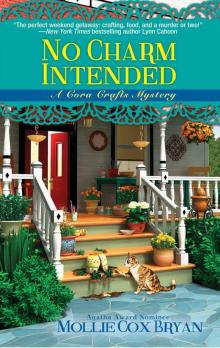 No Charm Intended
No Charm Intended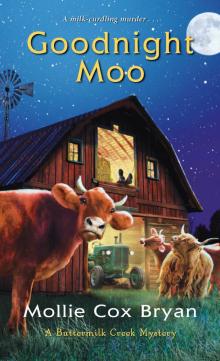 Goodnight Moo
Goodnight Moo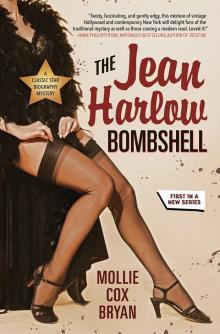 The Jean Harlow Bombshell
The Jean Harlow Bombshell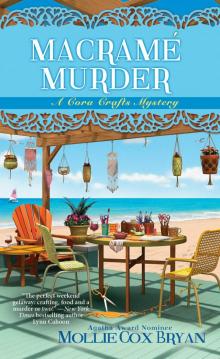 Macramé Murder
Macramé Murder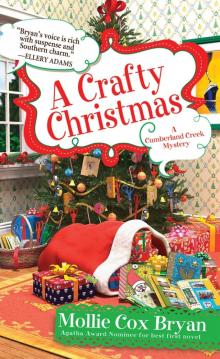 A Crafty Christmas
A Crafty Christmas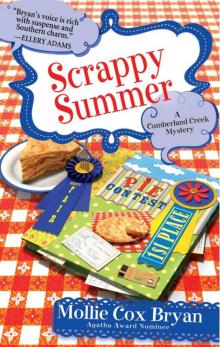 Scrappy Summer
Scrappy Summer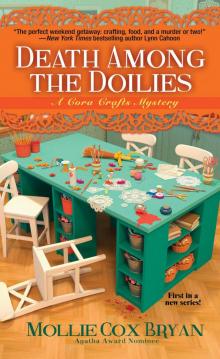 Death Among the Doilies
Death Among the Doilies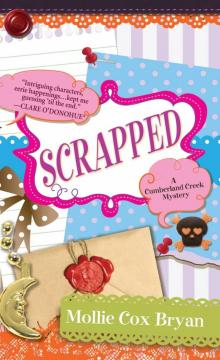 Scrapped
Scrapped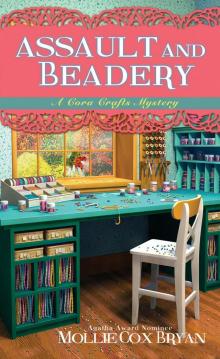 Assault and Beadery
Assault and Beadery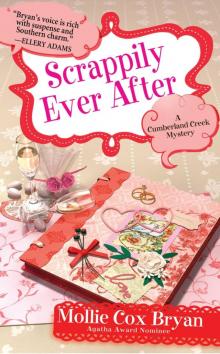 Scrappily Ever After
Scrappily Ever After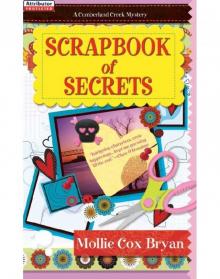 Scrapbook of Secrets
Scrapbook of Secrets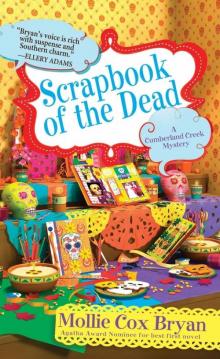 Scrapbook of the Dead
Scrapbook of the Dead